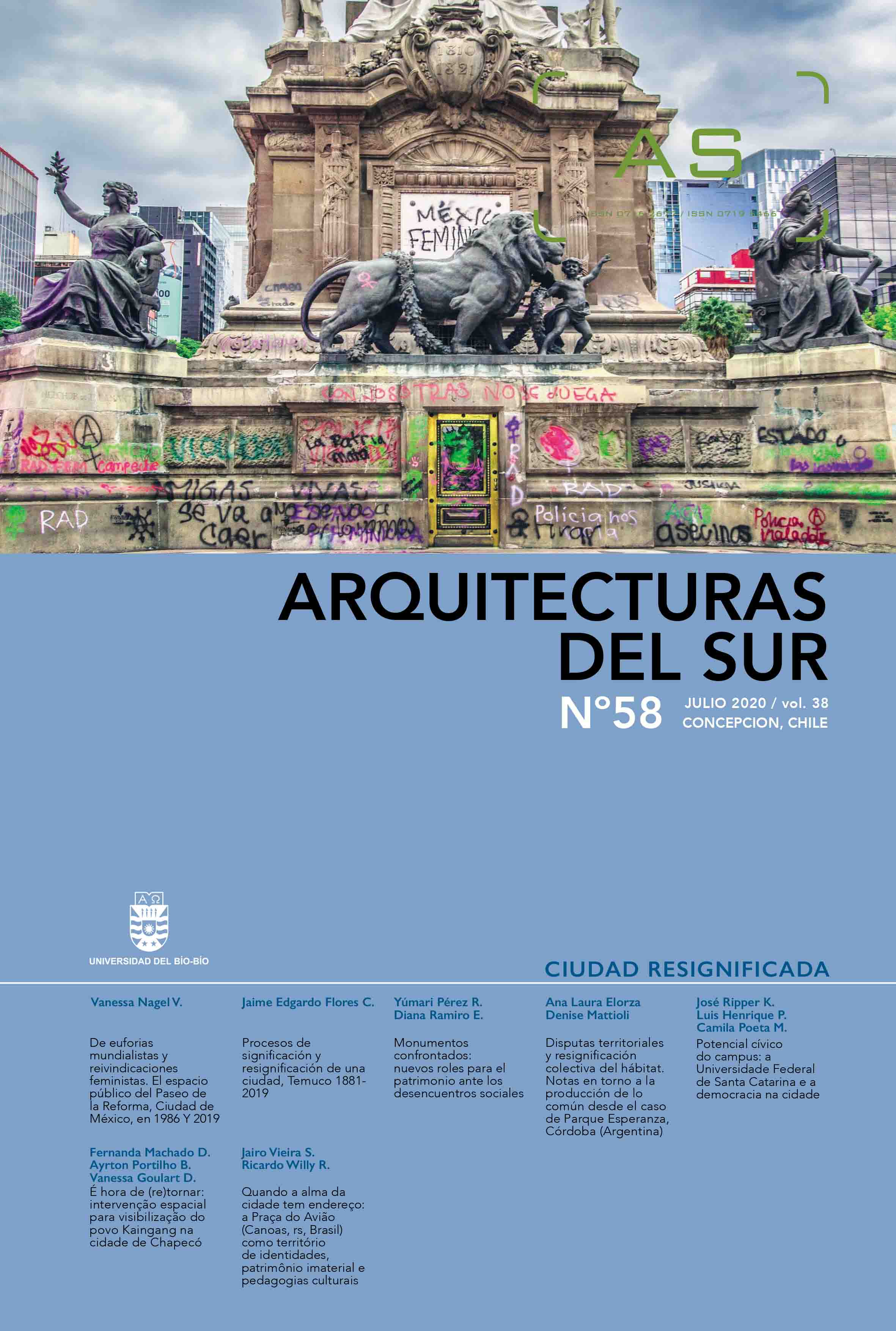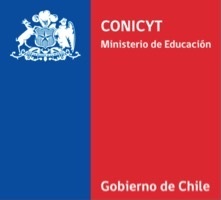Territorial disputes and the collective resignification of the habitat. Notes on the production of the common from the case of Parque Esperanza, Cordoba (Argentina)
DOI:
https://doi.org/10.22320/07196466.2020.38.058.04Keywords:
Territory, social inequality, social conflict, habitat, social organizationAbstract
Cities today are going through a process that deepens socio-territorial inequalities based on the advance of the spatial materialization of financial capitals and the appropriation of urban territories as a profitability strategy. However, diverse social groups dispute the spaces that this capital captures through collective strategies of resistance and by raising awareness, highlighting the dimension of “the common”, giving the exercise of the collective, the collaborative and/or community-based senses. This article aims at analyzing and interpreting the resistance of the residents who have socially produced their territories from the common in the face of expulsion strategies derived from speculative real estate processes, within the framework of the particularities assumed by this dispossession process in the metropolitan region of Córdoba (Argentina). In particular, we present the analysis of the Barrio Parque Esperanza case, which when faced with a process of judicial eviction from its neighborhood in 2018, has stood its ground for 14 months in a process of collective resistance and negotiation with the provincial state towards making the right to land and housing effective. The epistemological approach recovers the idea of the dialogue of knowledge proposed by the southern and decolonial epistemologies, since it seeks to recover the experiences from the perspective of the players in their own territories, looking to contribute with knowledge to demonstrate a specific social reality situation characterized by processes of fragility and, at the same time, with potential to boost the production of the habitat from the common.
Downloads
References
CASGRAIN, A. y JANOSCHKA, M. (2013). Gentrificación y resistencia en las ciudades latinoamericanas: El ejemplo de Santiago de Chile. Andamios, 10(22), 19-44. Recuperado de: http://www.scielo.org.mx/scielo.php?script=sci_arttext&pid=S1870-00632013000200003&lng=es&tlng=es.
ELORZA, A. L. Y MORILLO, E. (2017). El territorio urbano en disputa: representaciones y prácticas en procesos de autoproducción del hábitat. Revista ConCiencia Social, 1, 1. Recuperado de: https://revistas.unc.edu.ar/index.php/ConCienciaSocial/article/view/18426
Facultad de Ciencias Sociales (2018). Informe barrio comunitario Parque Esperanza - Juarez Celman. Recuperado de: https://sociales.unc.edu.ar/sites/default/files/Informe%20PARQUE%20ESPERANZA.pdf
GUTIÉRREZ AGUILAR, R. NAVARRO TRUJILLO, M. LINSALATA, L. (2016). Repensar lo político, pensar lo común. Claves para la discusión. En: Inclán, D. Linsalatta, L. y Millán, M. (coords.) Modernidades alternativas. México: Ediciones del lirio UNAM.
GUTIÉRREZ AGUILAR, R. (2017). Horizonte comunitario-popular. Producción de lo común más allá de las políticas estado-céntricas. Madrid, España: Traficantes de sueños.
HARVEY, D. (2009) El derecho a la ciudad. Revista digital del Programa de Gestión de la Ciudad, 1. Barcelona, España: Universitat Oberta de Catalunya.
HARVEY, D. (1977). Urbanismo y desigualdad social. Madrid, España: Siglo XXI.
JANOSCHKA, M. (2016) Gentrificación, desplazamiento, desposesión: procesos urbanos claves en América Latina. Revistainvi 31 (88): 27-71. Recuperado de: http://revistainvi.uchile.cl/index.php/INVI/article/view/1087
LANDER, E. (2000). Ciencias sociales: saberes coloniales y eurocéntrico. En LANDER, E. (ed.), La Colonialidad del saber: Eurocentrismo y Ciencias Sociales. Perspectivas Latinoamericanas. Buenos Aires, Argentina: CLACSO.
MALDONADO-TORRES, N. (2007). Sobre la colonialidad del ser: contribuciones al desarrollo de un concepto. En: Castro-Gómez, S. y Grosfoguel, R. (eds.) El giro decolonial. Reflexiones para una diversidad epistémica más allá del capitalismo global. pp. 127-167. Bogotá, Colombia: Iesco-Pensar-Siglo del Hombre Editores.
MUXI, Z., CASANOVAS, R., CIOCOLETTO, A., FONSECA, M., Y GUTIÉRREZ, B. (2011). ¿Qué aporta la perspectiva de género al urbanismo? Revista Feminismo/s, 17, pp. 105-129. Recuperado de: https://punt6.files.wordpress.com/2011/03/z-muxc3ad-martc3adnez-r-casanovas-a-ciocoletto-m-fonseca-y-b-gutic3a9rrez-valdivia.pdf
NAVARRO TRUJILLO, M. (2015). Hacer común contra la fragmentación en la ciudad: experiencias de autonomía para la reproducción de la vida. Revista El Aplante. 1.
PERALES, V. (2014). Ecofeminismo y Ciudad: Mujeres pensando una ciudad más saludable. Revista Arte y Ciudad, 6, pp. 7-26. Recuperado de: https://www.researchgate.net/profile/Veronica_Perales_Blanco
PÉREZ, L. Y MATUS, C. (2017). De la resistencia urbana al urbanismo ciudadano: Sujetos y estrategias patrimoniales en Concepción Metropolitano, Chile. Revista de Geografía Norte Grande, (66), 167-192. Recuperado de: https://scielo.conicyt.cl/scielo.php?script=sci_arttext&pid=S0718-34022017000100010
QUIJANO, A. (2000). Colonialidad del poder, eurocentrismo y América Latina. En: Lander E. (ed.), La Colonialidad del saber: Eurocentrismo y Ciencias Sociales. Perspectivas Latinoamericanas. Buenos Aires, Argentina: Clacso.
ROLNIK, R. (2018). Prólogo. En Hernández Manuel y Díaz García V. (Coord.) Visiones del hábitat en América latina. pp. 7-11. Madrid, España: Ed. Reverte.
SALINAS, L. (2017). ¿Gentrificación latinoamericana? Apuntes para su discusión. RevistArquis, 6 (1), pp.1-10. Recuperado de: https://revistas.ucr.ac.cr/index.php/revistarquis/article/view/29205/29180
SIGNORELLI, A. (1999). Antropología urbana. Barcelona, España: Editorial Antrophos.
SOUSA SANTOS, B. (2016). Desde la perspectiva de los condenados a la ciudad. En: Borja, J. Carrión, F. y Corti, M. (eds.) Ciudades para cambiar la vida. Una crítica a Hábitat III. Buenos Aires, Argentina: Café de las ciudades.
SOUSA SANTOS, B. (2009). Una epistemología del sur. La reivindicación del conocimiento y la emancipación social. México: Siglo XXI. Clacso.
SVAMPA, M. Y VIALE, E. (2014). Maldesarrollo: La Argentina del extractivismo y el despojo. Buenos Aires, Argentina: Katz.
VÁSQUEZ DUPLAT, A. M. (2017). Extractivismo urbano: debates para una construcción colectiva de las ciudades. Buenos Aires, Argentina: Ceapi-Fundación Rosa Luxemburgo.
VÁSQUEZ DUPLAT, A. M. (2018). Desalojos y extractivismo urbano en Argentina. Cuerpos y resistencia feminista. Revista Bravas, 6. Recuperado de: http://viejo.revistabravas.org/article/243/cuerpos-y-resistencia-feminista
Downloads
Published
How to Cite
Issue
Section
License
Copyright (c) 2020 Ana Laura Elorza, Denise Mattioli

This work is licensed under a Creative Commons Attribution-ShareAlike 4.0 International License.
The content of the articles published in each issue of Arquitecturas del Sur is the sole responsibility of the authors and does not necessarily represent the opinion of University of the Bío-Bío.
The authors will maintain their copyright; however, they will guarantee the journal the right to first publication and dissemination of their work. The publication of the article in Arquitecturas del Sur will be subject to the Creative Commons International license (CC BY-SA) that allows others to adapt: remix, transform and build on the material for any purpose, even commercially; share: copy and redistribute the material in any medium or format, as long as the authorship and first publication in this journal are acknowledged by citing them correctly, and their new contributions are under a license with the same terms.














 Programa de Información Científica/Concurso Fondos de Publicación de Revistas Científicas 2018/ Proyecto Mejoramiento de Visibilidad de Revistas UBB (Código:FP180007)
Programa de Información Científica/Concurso Fondos de Publicación de Revistas Científicas 2018/ Proyecto Mejoramiento de Visibilidad de Revistas UBB (Código:FP180007) 
